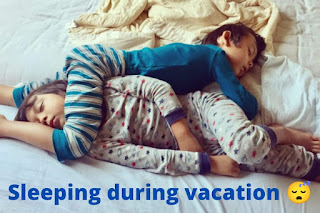Sleeping During Vacation
We are sure everyone likes a vacation every once in a while. Resting, recharging, and rejuvenating, who doesn’t love to escape from the bustling city life and get some quality self-care time for themselves. And while it is easy to think that going on a vacation is an opportunity to get some much-needed sleep, getting that peaceful slumber can sometimes be a task.
Multiple factors may disrupt your sleep quality when you are
on holiday. Whether you are spending your vacation in the same city, going to
another town, or going to another country altogether. Some of the prime factors
are:
Travel fatigue
Travel can bring fatigue and cause physical and mental
stress irrespective of the distance. Some of the symptoms that point to travel
fatigue include exhaustion, headaches, and sometimes fever. There are numerous
causes of travel fatigue which arise from anxiety, fear of heights, sitting on
a plane for long hours, and delays of any kind.
Jet lag
Jet lag is a short-term sleep disorder that occurs after
travelling on long-distance flights that cross multiple time zones. Difficulty
in sleeping is a prime symptom of jet lag. Jet lag usually disappears after a
few days. In some cases, it may last up to a few weeks.
New sleep settings
Yeah, we all hate this, don’t we? Various studies have
concluded that people have trouble sleeping the first night in new sleep
settings. Though it usually improves after the first night, it may not always
be the case, especially when your hotel room has an uncomfortable mattress,
excessive lighting or noise.
Change in diet
Although going on a vacation is a welcome break from our
routine life, it can sometimes bring unwanted disruptions. While on a vacay, we
may overindulge in excessive drinking and having heavy meals or even explore
the local cuisine, which may not sit well on your stomachs.
Here are a few tips that will help you keep sleep disruption
to a minimum.
·
A great way to reduce the impact of heavy
travelling is to give your body enough time to prepare. Make a checklist of
things you have to complete before leaving for your holiday, and try to get
them done well before leaving.
·
Try to practice a bedtime routine. Define a
bedtime routine for yourself. It could be practising deep breathing exercises,
reading a book, or having a warm bath before you go to bed. This routine helps
set your body clock, so when you are in a different time zone, doing these
activities signals your body that it’s time for bed.
·
Make your room sleep-friendly. Lower the
temperature and keep it dark and quiet. Bring your favourite sleep accessories
like a pillow, bedsheet, or eye mask if possible.
·
Limit your alcohol and caffeine intake, as
taking them in large doses can mess with your sleeping schedule.
·
Limit blue light exposure. Not just for vacation
but in general as well. The blue light emitted from electronic devices may
suppress the release of melatonin, the hormone that tells your body it’s time
to sleep. Instead, you can go for a stroll in the city rather than watch
Netflix in your hotel room.
Getting a good night’s sleep when you are holidaying is achievable. Provided you follow the above listed practises.




Comments
Post a Comment